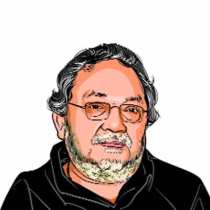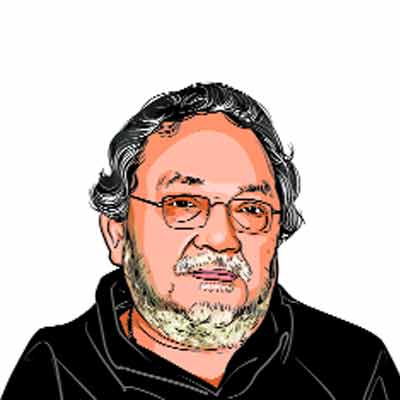Imaginary homelands
Allahabad was the name of an aspiration to independent, secular, cosmopolitan modernity — a hope, a sensibility. Prayagraj is a pernicious, hurtful fiction

(Illustration: C R Sasikumar)
I have never had much sympathy for Allahabad nostalgia — you see, I live here, in the midst of its tawdry mediocrity. This nostalgia is an affliction that strikes mainly non-resident Allahabadis who, blessed with the advantage of distance, mourn their lost youth, invoking something that is not so much a memory as it is — always was — a fantasy. But, given the fantasies that are increasingly at play in our beloved land, it might well be one of the more attractive ones around — certainly more attractive than the “Prayagraj” fantasy that is being substituted for it.
Let us first get the history out of the way — although, to be fair, history has never been much of an obstacle for the fantasists and con-artists currently in power. History for them is, at best — a kind of convenience, an authenticating cosmetic for their enabling fictions. So, variously, Rana Pratap actually won the battle against Akbar, and Savarkar was a brave patriot who never secured his release from Port Blair by recanting his nationalism and promising his fealty and his future innocence to the colonial power. But — as was seen most egregiously in the matter of the Babri Masjid — appeals to historical evidence are beside the point.
It is true that the name Prayag antedates the city of Allahabad — but Prayag is merely a place, the riverbank where the Ganga and the Yamuna meet. This confluence has been sacred to Hindus from ancient times — but it is still not a city. It is at best a pilgrim settlement, home to pandas and their prey. The city is the settlement that came up in the floodplain between the Ganga and the Yamuna, upstream from the confluence. And it was named Ilahabas — a place where holiness dwells — in recognition of its traditional sacred status, and not as the insult of a conqueror. The floodplain itself became available for settlement after the construction of the embankment — the bund that is, even in Prayag, even today — identified with Akbar. This city is, we know on credible evidence, of medieval origins, and grew to affluence with the peace and harmony that was guaranteed by Akbar’s fort, overlooking the great waterway that carried the agricultural produce of the Doaba to distant markets. In later centuries, this city was expanded under colonial aegis, and became one of the major centres of British power — the capital of the North-West Province, that extended all the way from Bengal-Bihar to the fractious border with Afghanistan. Just as Allahabad was appended to the existing and fairly minimal pilgrim settlement of Prayag, so the British appended their own residential and gracious Civil Lines, which might soon find refuge exclusively in the nostalgia of non-resident Allahabadis. Because the great engines of “vikaas” are busily chopping up the guava orchards, and high-rises rise where once the bungalows sprawled. So history tells a relatively pleasant story — barring bloody interludes such as 1857 — of an evolving and now mostly remembered cosmopolitan urbanism. But the preferred narrative — pickled in ressentiment — is one of conquest, and disenfranchisement. And now, reenfranchisement, the coming into its own of a conquered people who are, we are expected to believe, finally reclaiming their cultural heritage. Even as they trumpet their vociferous ignorance, unconsciously betraying their real “sanskaar”.
Still, as a loyal and unfortunately resident, Allahabadi, I must affirm that “Allahabad” was always an imagined place — an imaginary homeland, to coin a phrase. The national headquarters of the Indian National Congress, Allahabad was the capital of the India that was as yet “unfree”. As such, “Allahabad” was the name of an aspiration to independent, secular, cosmopolitan modernity, that is a fiction. A hope, a sensibility.
But so is “Prayagraj” a fiction, an imaginary place. Of course, there is a perfectly real, tangible Prayagraj, and it is a fine, convenient train. But the “Prayagraj” that seeks to replace “Allahabad” is a fiction; and, unlike the name Allahabad, which was a generous, enlightened fiction, this is a pernicious, hurtful fiction. “Allahabad” was a fictional place of secular urbanity — the sort of place that ambitious young men like Dharamvir Bharati for instance, came to, to acquire cosmopolitan urbanity. People who read books — unlike people who talk about culture in khaki shorts — might recall his novel Gunaahon ka Devta — and similar works by many other writers. The corresponding fiction of “Prayagraj” is Pandanagari Prayag, bathed in the odour of Brahminical sanctity, in which grubby, grabby pandas prey on the desperate and poor people who come to the confluence to fulfil traditional rituals. At its finest, it is a fantasy of an imagined monkish time, in which learned rishis sought, and reliably failed, to evade the attentions of lascivious apsaras. The semi-literate chuttiyadharis of the heartland, suitably turned out with the dabs and daubs of their upper-caste status, derive a curious gratification from these symbolic references to that vaunted, largely invented past. This is, necessarily, a past before history, and its manifold pollutions.
Not surprisingly, the dominant colour of this fantasy is saffron, sadhu-bhagwa. I am reminded of a little doggerel associated with a particular point on the old Allahabad-Banaras road: Bairagiya nala julum jor/ Janh sadhu bhes mein basein chor/ Jab tabla baaje dheen-dheen/ Tab ek-ek par teen-teen
Traditionally saffron, sadhu-bhes, has been the preferred disguise of crooks. And while I would not go so far as to say that all those who don saffron are crooks, it is certainly true that if a crook wants a working disguise in today’s India, saffron is a pretty good choice, right? Just read the literature of the early 20th century, before we became sanctimonious hypocrites, too timid to call out the racket of baba-baazi, despite the colourful rapist babas who adorn our daily newspapers.
Still, going by the current standards of nastiness — when eight-year old girls can be raped and murdered, and the rapists garner social acclaim; in which boys of nine and 10 can have their heads smashed for no apparent reason other than the fact that they happened to be wearing the wrong kind of cap — this name-changing business is relatively innocent. After all, if the complex and daunting business of governance can be reduced to mere name-changing, all that is required is a few pots of paint — Gurgaon-Gurugram, Simla-Shyamala, Agra-Agastyapuri — why, governance is easy, easy-peasy!
But perhaps there is a deeper message in this obsession with changing names. After all, it is not as if, after four years and more, this regime, backed by a majority, can claim any great achievements. As for governance, they have done little more than rename the existing schemes and programmes of the previous government — when in doubt, “Atal” it! Making anything isn’t quite their style. But destruction is. And, come to think of it, even the renaming of “Allahabad” as “Prayagraj” feels like a demolition. The first was a pleasant, generous fiction, which inspired people to become better than they might have been otherwise; the other is a pernicious, hurtful one, which merely frees vicious people to channel their inner bhakt.
Welcome to the past — as future!
PS: I would like to dedicate this piece on Allahabad, lately deceased, to my friend KC, also lately deceased, who was an embodiment of the local tradition of prickly self-respect.
The writer taught in the Department of English, Delhi University.
For all the latest Opinion News, download Indian Express App
More From Alok Rai
- The spy who wasn’tNambi Narayanan’s acquittal raises a crucial question: Who is responsible for the evils of the state?..
- The native colonialV S Naipaul gave writers in once-colonised countries confidence. But he also exonerated colonialism...
- The soundtrack of democracySupreme Court order on Jantar Mantar frames an often-ignored reality: Protest is a part of polity and the inconvenience it causes an affirmation of our…








































No hay comentarios:
Publicar un comentario